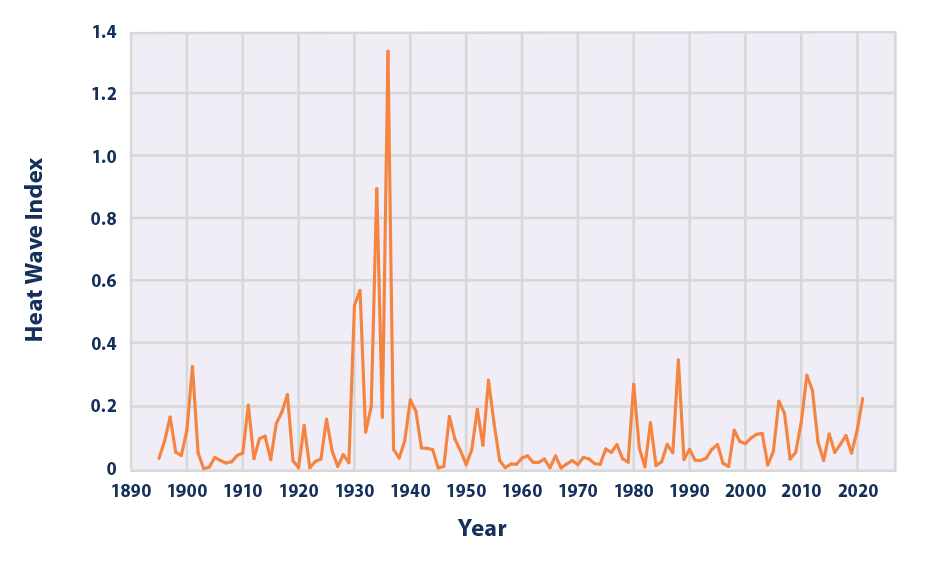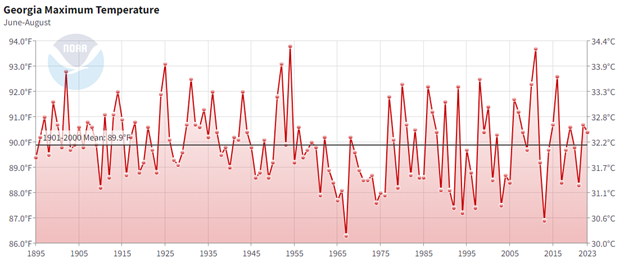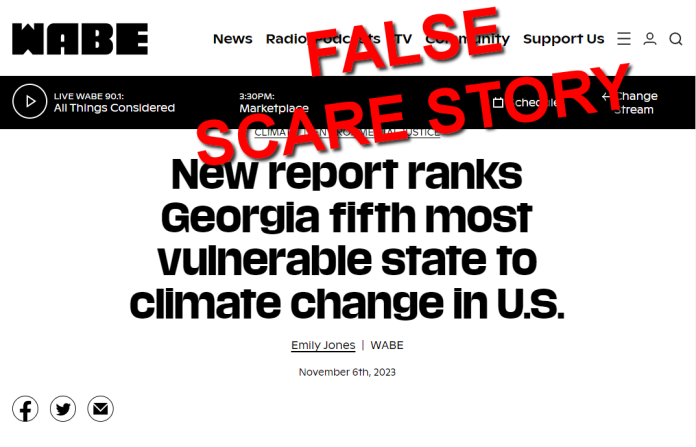An opinion piece by radio station WABE in Georgia asserts that Georgia is among the states most vulnerable to climate change. This is no evidence suggesting that Georgia is, in fact, especially vulnerable to climate change, much less that is it among the states most endangered by it.
WABE’s article cites a new report from the environmental lobbying organization, the Environmental Defense Fund (EDF), which ranks Georgia fifth most vulnerable state to climate change in the United States. In the very first paragraph it becomes apparent that WABE should have checked a few facts before uncritically parroting EDF’s claims. For instance, the very first paragraphs nullify the headline:
The most vulnerable county in Georgia, according to the analysis, is Macon-Bibb, largely because of existing conditions like poverty and poor health.
In Macon, one of the major baseline risk factors is air pollution and the health problems that can be caused from it. Lots of sources have polluted Middle Georgia’s air for a long time: coal-burning power plants, diesel train engines and two major highways. Worsening heat waves due to climate change can exacerbate that pollution.
Poverty and health are local socioeconomic risk factors, not indicators of climate change.
Other factors that EDF claims make Georgians particularly vulnerable to climate impacts is poor infrastructure, which makes the state’s “community resilience” low, poor access to health care, and poor transportation infrastructure. Climate change has nothing to do with how Georgia’s politicians invest their infrastructure resources or how they or their constituents rank public and private spending priorities, like health care and transportation.
Also, there is no evidence air pollution is driven by climate change. It is a man-made effect of industry, manufacturing, and transportation which can vary widely from year to year. EPA data show regulated pollutants have declined dramatically in recent decades. Although the article tries to link climate change to air pollution by saying heat waves are a contributing factor to pollution and that heat waves are driven by climate change. Research and real-world data show that heat waves have neither become stronger nor more frequent during the recent period of modest climate change. For example, figure 1 below, from the Environmental Protection Agency (EPA), clearly demonstrates that heat waves were far worse in the past than they have been in recent decades.

As mentioned in Climate at a Glance: U.S. Heatwaves, objective data show the all-time high temperature records from heat waves were set in most states in the first half of the twentieth century, decades before anyone was talking about man-caused climate change. In addition, data from the National Oceanic and Atmospheric Administration (NOAA) shows no sustained increase in daily summer high temperatures (June-August) in Georgia as shown in Figure 2:

As shown in figure 2, there were far worse and more frequent summer heat waves in the past in Georgia, well before “climate change” became an issue. Clearly, there’s no threat from “Worsening heat waves due to climate change can exacerbate that pollution,” as WABE claims.
Temporary, localized meteorological conditions during heatwaves can stagnate normal wind patterns and air flow, making air pollution hang around longer than it normally would. But weather is not the same as climate, and here WABE and EDF incorrectly conflate the two.
Since NOAA data shows there has been no recent increase in summer heat waves in Georgia and EPA data show pollution itself is in decline, EDF’s and WABE’s attempts to tie climate change induced heatwaves to air pollution problems in Georgia are demonstrably false. As a result, it seems this story is little more than another poorly researched scare story about the supposed harms climate change is causing. There is no factual basis whatsoever for ranking Georgia and the 5th most vulnerable state to climate change.




















Another example of false claims based on faulty information seems like the tone deaf alarmists don’t care about facts just the outcomes! They have lost all credibility when extreme weather events are extrapolated to climate change catastrophes! There’s no evidence to support this hypothesis other than accepting the distortion asserted as being true which never has been proven!